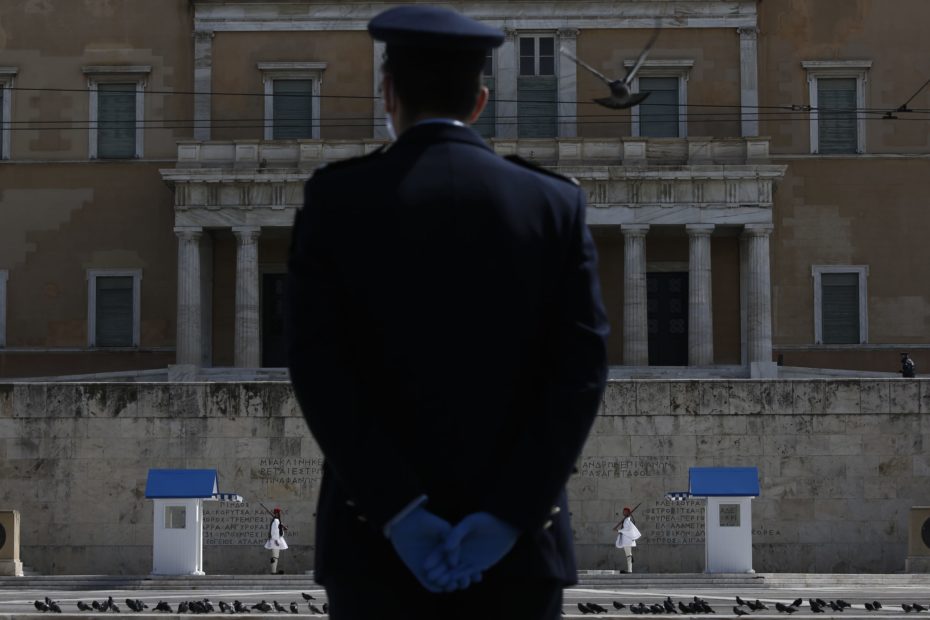There is not a single Athenian who could have ever imagined that the streets of the city would be completely empty. Even in mid-August, when the majority of Greeks find themselves at the beach during their summer holidays, there are tourists strolling around the centre of Athens. Over the past days, however, ever since Greek Prime Minister Kyriakos Mitsotakis announced a strict lockdown for the country, life has changed rapidly and drastically, just as it has in many other countries around the world.
Only around 50%-40% of businesses remain up and running and certain employees now have to commute to work by getting a written certification from their employer. Some others work from home and only have the right to leave their homes to go to the supermarket or pharmacy. The Greek approach at the time of Mitsotakis’ decision to shut down the country was to enact strict measures from the start to reduce the spread of the virus within the community and flatten the curve as early as possible in the hope that the long-term effects on the Greek economy could be minimised.
With the tough measures in place and key parts of the economy completely frozen, Greece is facing a major recession this year. During a teleconference of the Cabinet, the country’s Minister of Finance, Christos Staikouras, announced that the budgetary projection for 2020 is likely to be well below the projected 2.8% growth rate. Estimates about the extent of the recession vary, but the European Central Banks’s Christine Lagarde warned European leaders that for each month that Greece or any other European is on full lockdown, with most of the industries and the entire tourism sector shut, the overall loss amounts to an astounding 2% of the GDP. This percentage, of course, varies from country to country, however, the effect on Europe’s many economies is terrifying.
For Greece, the effect of the coronavirus outbreak was a big setback, since the country was coming out of a long-standing fiscal consolidation process and years of recession. Just one month ago, the projections for its immediate economic future looked as optimistic as it had during the days before the 2008 global financial crisis.
Mitsotakis is considered a pro-business and liberal pro-market leader, who has been trying to mobilise international capital since he came into office in July 2019. Under the current circumstances, however, Mitsotakis will be forced to join other European economies in having to ask for much-needed aid to help Greece weather the storm of the COVID-19 outbreak.
Mitsotakis was crucial in getting the ECB to include Greece in its extraordinary bond-buying programme. Before the bank’s most recent teleconference, the Greek prime minister talked over the phone with Lagarde and explained that Greece had upheld all of its fiscal commitments over the past few years, a fact that was included in the general European rule for the exceptions concerning the Stability and Growth Pact.
Mitsotakis also co-signed a letter to European Council President Charles Michel, requesting the creation of a European debt-management mechanism, with a provision for a respective allocation of the funds. Alongside leaders such as France’s Emmanuel Macron, Italy’s Giuseppe Conte, and Spain’s Pedro Sanchez, Mitsotakis put forward a request for a Eurobond and for the mutualisation of debt for the “Corona-Period”.
The four leaders also emphasised that more funds from the existing EU budget should be allocated for the management of the pandemic, especially for 2020 and 2021.
Whatever it takes
The Greek government has already started taking measures to support businesses and employees. €800 will be given to all employees working in businesses that were forced to terminate their jobs for the period from March 15 until April 30. Until June, the aforementioned businesses will not be obliged to pay taxes, while the total government spending to support the economy will reach 2.5% of the GDP, €4.7 billion.
Greece is reaching a “whatever it takes moment” in its approach to fighting the COVID-19 outbreak. In recent closed meetings, Mitsotakis estimated that the financial implications for the country will be dire. As a result, his government is willing to use whatever means it has at its disposal to prop up the economy, including a €35 billion reserve that has been accumulating since 2015.
A government official told New Europe that the Greek government could not, however, regularly tap into this reserve since the country’s yield in the bond-markets “would explode”. As a result, an intervention by the ECB is seen as critical for safeguarding Greece’s economy.
Further steps will be necessary, as everyone in Athens now knows. In the coming weeks, new announcements are expected which will cover more business sectors and create a shield against bankruptcy. Mitsotakis is convinced that there should be a coordinated European response since many of the EU’s 27 members will be left with brutally battered, and potentially bordering on collapsing, economies.
Source: Greece is reaching a ‘whatever it takes’ moment | New Europe

